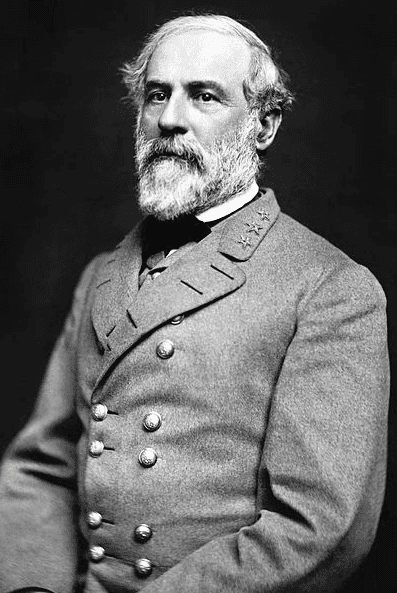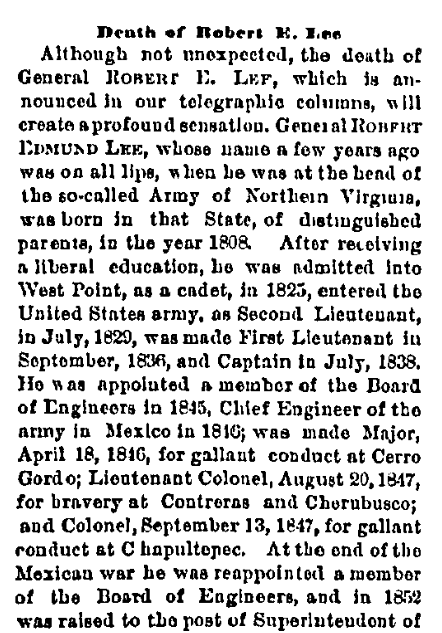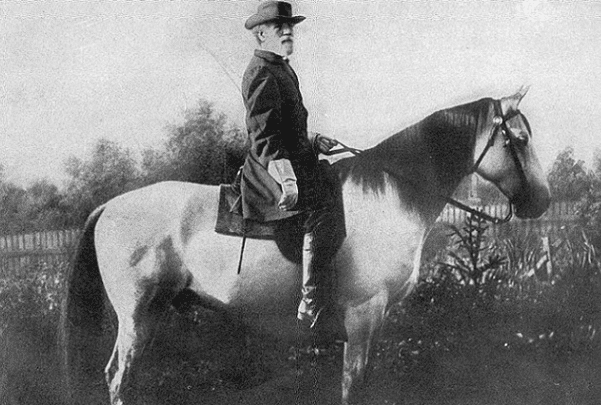Around 9:30 a.m. on 12 October 1870, Robert E. Lee, the Confederate general who had spent his years after the Civil War serving as the much-respected president of Washington College, died. He was 63. Lee had suffered a stroke on September 28, and in his debilitated state contracted pneumonia, which did him in. He died in Lexington, Virginia, the home state he loved so well.

As you read Lee’s obituary below, it is easy to see why President Abraham Lincoln offered the highly experienced and qualified Lee command of the Union Army on 18 April 1861, the day after Virginia voted to secede. Lee was torn between his oath to serve the United States and its army, and his deep love for Virginia – but Virginia won out, and on 20 April 1861 Robert E. Lee resigned from the U.S. Army and headed home to become commander of the Virginia military forces.

Here is a transcription of this article:
Death of Robert E. Lee
Although not unexpected, the death of General Robert E. Lee, which is announced in our telegraphic columns, will create a profound sensation. General Robert Edmund [correction: Edward] Lee, whose name a few years ago was on all lips, when he was at the head of the so-called Army of Northern Virginia, was born in that State, of distinguished parents, in the year 1808. After receiving a liberal education, he was admitted into West Point, as a cadet, in 1825; entered the United States Army, as Second Lieutenant, in July 1829; was made First Lieutenant in September 1836; and Captain in July 1838. He was appointed a member of the Board of Engineers in 1845; Chief Engineer of the Army in Mexico in 1846; was made Major, April 18, 1846, for gallant conduct at Cerro Gordo; Lieutenant Colonel, August 20, 1847, for bravery at Contreras and Churubusco; and Colonel, September 13, 1847, for gallant conduct at Chapultepec. At the end of the Mexican War he was reappointed a member of the Board of Engineers, and in 1852 was raised to the post of Superintendent of the Military Academy at West Point, which he held till March 1855, when he was appointed Lieutenant Colonel of Cavalry. He was appointed Colonel of Cavalry on the 16th of March, 1861, but resigned his commission in the United States Army a few days afterward under circumstance with which most of our readers are familiar. What General Lee did for the cause of the Rebellion during those eventful four years which will never be effaced from the memory of Americans, will be judged by history; and history, furthermore, will pass at a future day upon his military talents that opinion which his contemporaries will hardly be able to give.
Soon after the close of the war he accepted the Presidency of Washington College, Virginia, and sustained a position of becoming dignity in regard to the past. Southerners almost universally entertained for him an affection that perhaps was not equaled in its intensity excepting by that in which General Thomas was held by the people of the North.
Only very recently had he accepted the Presidency of the Valley Railroad in Virginia – the news of the acceptance barely preceding the announcement of his attack by his last illness.
Note: There are more than 230 million obituaries in GenealogyBank’s Historical Newspaper Archives, providing life stories and family information essential for genealogy research. Come take a look today, and see what you can discover about your ancestors.
Related Articles:
